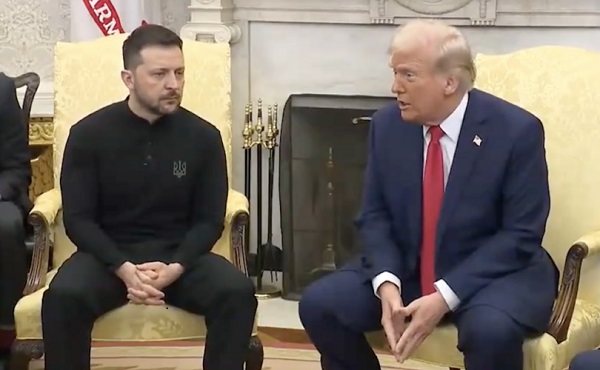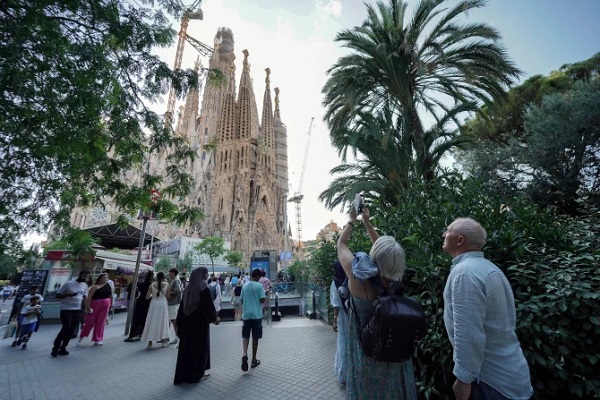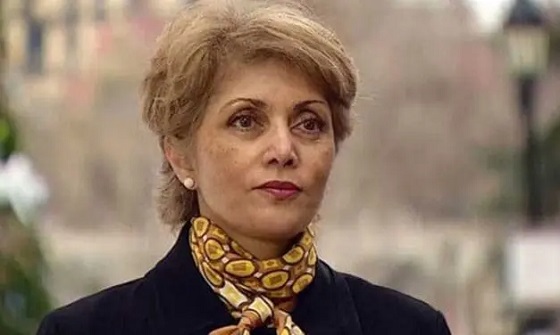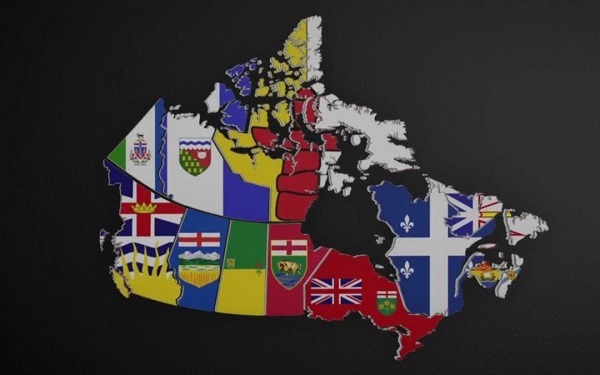International
Trump, Zelensky clash represents seismic shift in world politics

From LifeSiteNews
By Frank Wright
A meeting which began over a mineral deal and peace in Ukraine has developed into a historic shift in world politics.
“You don’t hold the cards,” President Donald Trump told Ukrainian President Volodymyr Zelensky at the White House on February 28.
When Zelensky retorted that he was “not playing,” Trump rebuked him. “Yes. Yes you are. You are gambling with the lives of millions of people.”
In an exchange which reframed the Ukraine war as a reckless gambit towards nuclear Armageddon, both Trump and Vice President JD Vance signaled an epochal shift away from the global consensus of the last forty years – and towards the interests of peace and of the American people.
“You’re gambling with World War III,” Trump continued, explaining to Zelensky that “…what you’re doing is very disrespectful to the country, this country that’s backed you far more than a lot of people say they should have.”
Friday’s White House meeting between the unelected leader of Ukraine is one of several recent visits and follows that of the U.K.’s Keir Starmer and France’s Emmanuel Macron.
Zelensky had nominally arrived to finalize a deal for U.S. rights over Ukrainian minerals, brokered by U.S. Secretary of State Marco Rubio. The deal was seen as a means of the U.S. recovering some of the claimed 350 billion dollars Trump has said that America has supplied to Ukraine in financial and military aid since February 2022.
Instead, Zelensky left immediately after being “kicked out” of the White House, the deal unsigned, and with his planned lunch reportedly “given to the interns” by Trump. Fox News reported White House insiders saying Zelensky was “begging to stay,” as a planned joint press conference was canceled.
Zelensky was congratulated on his “dignity” following the meeting, by the unelected European Union chief Ursula von der Leyen.
Immediate UK summit, ‘boots on the ground?’
Having refused to apologize, Zelensky flew to London for a pre-planned March 1 “summit” of pro-war leaders attended by NATO chief Mark Rutte, EU Chief Commissioner Ursula von der Leyen, U.K. Prime Minister Keir Starmer and the leaders of France, Italy and Poland.
The summit followed a “bizarre” flurry of identical social media posts sent by pro-war European leaders in support of Zelensky.
Statements were made following the meeting which suggested U.K. and EU support for Ukraine could continue in the absence of U.S. involvement – with the U.K. prime minister announcing afterwards that he is “ready to put boots on the ground” in Ukraine.
Starmer went on to announce a further $2.2 billion in “loans” to Ukraine to purchase missiles.
EU plan falls apart
The London Summit claimed to be making progress towards an EU-led ceasefire but concluded with no agreements in place.
Following the claim by France’s Macron that a truce in Ukraine had been proposed, the U.K. Armed Forces minister told Times Radio Monday morning that “No agreement has been made on what a truce looks like.”
Zelensky told U.K. reporters he was now “ready to sign” the minerals deal agreed with Donald Trump.
A further meeting has been scheduled. Following the remarks of the U.K’s Starmer, the leaders of France and Poland announced that neither nation would be sending troops to Ukraine – despite the assurances given by Starmer that a EU and U.K. “coalition of the willing” would do so.
The U.K.’s Ambassador to the U.S., Peter Mandelson, appeared to undermine Starmer’s position, calling for all leaders to give “unequivocal backing” of Trump’s initiative.
As the U.K.’s Daily Telegraph reported that Donald Trump’s meeting with Russian President Putin is being “fast tracked,” news also emerged that Trump is “discussing cutting all military aid to Ukraine,” with the Russians and Hungarians saying “Zelensky does not want peace.”
So severe is the crisis for Zelensky that a former staunch supporter of the proxy war, Senator Lindsey Graham, called for his resignation.
NATO without the US
The U.S. government is pursuing negotiations with the Russians independently of the European and British leadership, whose own summit quietly concluded that any future settlement in Ukraine ultimately relies on the U.S. to guarantee it.
News now emerges that the U.S. is seeking to reopen the NordStream pipelines in direct talks with the Russians.
Missiles fired from Ukraine into Russia rely on U.S.-led satellite intelligence and guidance. There is no realistic chance of unilateral military action in Ukraine by Europe’s depleted and scaled back militaries – a position underlined by EU statements calling for comprehensive rebuilding both of European defence and the industry required to restore it to realistic levels.
The picture emerging is one of a stark reality. There is no NATO absent U.S. commitment, and neither the U.K. nor the EU can act independently of the U.S. to confront a major power.
This too was foreshadowed on February 28, when Donald Trump asked Keir Starmer, “Could you take on Russia by yourselves?”
It is a serious question with an obvious answer, and it was followed by laughter.
Reality has bitten hard this weekend, showing how the U.S. leadership has not merely changed the color of the neckties worn in government, but is pursuing an historic break with decades of U.S. grand strategy.
British commentator Matt Goodwin said that the meeting signified a far wider geopolitical realignment, suggesting the U.K. and European leadership at the London summit had failed to recognize this historic shift.
UKRAINE: One lone European voice explaining how Trump is right. pic.twitter.com/QqcBbCrQGZ
— @amuse (@amuse) March 2, 2025
U.K. and European leaders may continue to generate dramatic headlines with bold talk and unrealistic initiatives, but this too is beginning to resemble an attempt to win a media war whilst the battle in reality is lost to them.
The Trump White House sees the war in Ukraine is seen as a needless waste of human life and money which “should never have happened.” Hungarian President Viktor Orbán also spoke out strongly in favor of peace, adding Ukraine was now in a “dire situation.”
U.S. negotiators now “talk normally” with those of the Russians, after a Biden administration which refused to speak to them at all for several years.
With Trump set to address Congress Tuesday night, an era-defining announcement may be on the cards.
Those cards are clearly held by the United States and no other nation in its sphere of influence. How will those cards be played? An earlier post by Trump on his Truth Social strongly suggests the U.S. will seek to establish and normalize trade with Russia regardless of the liberal-globalist regimes in Europe – all of whose leadership have invested their political fortunes in the war in Ukraine.
“We should spend less time worrying about Putin, and more time worrying about migrant rape gangs, drug lords, murderers, and people from mental institutions entering our Country – So that we don’t end up like Europe!” wrote Trump.
This is a direct hit on the British and European governments whose pursuit of the global consensus has led their nations into chaos. Trump is reshaping the world around the recognition of this reality, and of the ruin it has caused. With Trump, Speaker Mike Johnson and Elon Musk already suggesting an audit of all funding to Ukraine, the card of the severe corruption funded by this war may be played soon.
This moment comes alongside U.S. warnings that the enemy is not outside but within Europe, as its governments suppress free speech and refuse to respect the results of elections. A further scandal looms over how Ukrainian aid was spent, and where the weapons themselves went – with Tucker Carlson and even CBS news reporting that between one and “half” of all military equipment supplied has vanished on to the black market in Ukraine. How far were these pro-war, pro-Zelensky leaders invested in a nation described in the 2021 Pandora Papers as one of the most corrupt in the world?
There are now two visions of the future of the West, and only one has a winning hand. Tomorrow night, perhaps we shall see another Trump card thrown down.
You can watch all 46 minutes of the February 28 meeting between Trump, Vance and Zelensky here.
International
Nigeria better stop killing Christians — or America’s coming “guns-a-blazing”

President Trump on Saturday warned that the United States military “may very well” launch an armed intervention in Nigeria if the government continues allowing the slaughter of Christians by radical Islamist groups — a stark escalation following his recent designation of the African nation as a “Country of Particular Concern.”
— Rapid Response 47 (@RapidResponse47) November 1, 2025
In a post on Truth Social, Trump directed the Department of War to “prepare for possible action,” warning Nigerian officials that Washington’s patience had run out. “If the Nigerian Government continues to allow the killing of Christians, the U.S.A. will immediately stop all aid and assistance to Nigeria and may very well go into that now disgraced country, guns-a-blazing, to completely wipe out the Islamic terrorists who are committing these horrible atrocities,” Trump wrote. He added that any American strike “will be fast, vicious, and sweet, just like the terrorist thugs attack our cherished Christians.”
The warning follows Trump’s declaration Friday that “Christianity is facing an existential threat in Nigeria,” where thousands have been massacred by Islamist militants. He said the numbers were staggering — citing roughly 3,100 Christian deaths in Nigeria compared with about 4,476 worldwide — and ordered Rep. Riley Moore (R-W.Va.) and House Appropriations Chairman Tom Cole (R-OK) to immediately investigate and report their findings. “Something must be done,” Trump wrote, calling the situation “a mass slaughter” and urging swift action.
Trump’s call to action has drawn praise from prominent voices. Rap mogul Nicki Minaj reposted Trump’s earlier remarks and said his attention to the plight of Nigerian Christians gave her a “deep sense of gratitude.” “We live in a country where we can freely worship God,” she wrote on X. “No group should ever be persecuted for practicing their religion.”
Trump’s increasingly forceful stance on Nigeria marks one of the clearest demonstrations yet of his promise to defend persecuted Christians worldwide — and to use America’s power, if necessary, to make that protection real.
Crime
Public Execution of Anti-Cartel Mayor in Michoacán Prompts U.S. Offer to Intervene Against Cartels

“I don’t want to be just another mayor on the list of those executed”
On the first night of November, during Day of the Dead celebrations, the independent, anti-cartel mayor of Uruapan in Michoacán, Carlos Manzo, was assassinated in the heart of his city during a public festival. His bloody murder has underscored the deadly risks faced by local officials who may lack adequate protection from a state that critics say is corroded by corruption and penetrated by powerful cartel networks that, in some regions, have supplanted government authority. The killing intensifies urgent questions about political and police corruption, cartel impunity, and the scope of U.S.–Mexico security cooperation — with a response from the U.S. State Department today offering to “deepen security cooperation with Mexico.”
Manzo, a fiercely outspoken anti-cartel mayor who took office in 2024 as Uruapan’s first independent leader, was gunned down as he stood before crowds at the annual Day of the Dead candlelight celebration. Witnesses said gunfire erupted shortly after Manzo appeared onstage, holding his young son moments before the attack. The festival, known locally as the Festival de las Velas, drew hundreds of families to Uruapan’s central plaza — now transformed into the scene of Mexico’s latest high-profile political assassination, and a catalyst for nationwide outrage, as online protests surged and citizens called for demonstrations against cartel violence.
According to early reports, at least two suspects have been detained and one attacker was killed on site. Authorities asserted — despite the success of the attack — that Manzo had been under National Guard protection since December 2024, with additional reinforcements added in May 2025 following credible threats to his life.
In Washington today, the killing drew political reaction. “My thoughts are with the family and friends of Carlos Manzo, mayor of Uruapan, Michoacán, Mexico, who was assassinated at a public Day of the Dead celebration last night. The United States stands ready to deepen security cooperation with Mexico to wipe out organized crime on both sides of the border,” Deputy Secretary of State Christopher Landau, the former U.S. ambassador to Mexico, said in a statement shared online.
Federal Security Minister Omar García Harfuch said the gunmen “took advantage of the vulnerability of a public event” to carry out the attack, despite a standing security perimeter.
President Claudia Sheinbaum condemned the killing as a “vile” assault on democracy and vowed there would be “zero impunity.” Her administration convened an emergency security meeting and pledged that the investigation would reach the “intellectual authors” of the crime. Yet the murder has already ignited outrage across Mexico over the government’s failure to protect local officials in cartel-dominated states such as Michoacán, where extortion, assassinations, and territorial disputes continue to erode basic governance.
Manzo had publicly warned of his fate. “I don’t want to be just another mayor on the list of those executed,” he said earlier this year, as he pressed the federal government for better coordination between municipal and military authorities. For years, Uruapan — an agricultural and trade hub in western Mexico — has been the site of deadly clashes between the Jalisco New Generation Cartel and remnants of the Knights Templar Organization, both vying to control lucrative extortion and drug routes.
The killing of Manzo fits a dark and familiar pattern. In 2025 alone, several mayors in Michoacán, Guerrero, and Tamaulipas have been killed in attacks widely attributed to organized-crime groups. In June, the mayors of Tepalcatepec and Tacámbaro were ambushed and slain while traveling in official convoys. More than 90 local officials have been murdered since 2018 — a rate that analysts say reflects how cartels target municipal governments to ensure political control over territories tied to narcotics, mining, and agriculture. Uruapan, at the heart of Mexico’s avocado belt, is a strategic prize for the cartels that tax every shipment leaving the region.
The mayor’s death also recalls earlier tragedies that scarred the nation. In 2012, Dr. María Santos Gorrostieta Salazar, the former mayor of Tiquicheo, was abducted and murdered after surviving two assassination attempts and defying cartel threats. Her death became emblematic of the dangers faced by reformers who refuse to cooperate with criminal groups. More than a decade later, Manzo’s murder illustrates that little has changed — except the brazenness of the attackers, now willing to strike in front of cameras and families celebrating one of Mexico’s most sacred holidays.
The killing has also reignited long-standing U.S. frustration over Mexico’s inability to stem cartel violence, even as the Trump administration has expanded counter-narcotics operations at the border. Under Trump’s renewed directives, the U.S. has classified several Mexican cartels as foreign terrorist organizations and empowered the Pentagon to develop strike options against high-value targets abroad. A September 2025 joint statement between Washington and Mexico City pledged deeper intelligence sharing and cross-border enforcement initiatives, including efforts to halt arms trafficking southward.
However, Mexico’s government remains deeply wary of any U.S. military involvement on its soil. President Sheinbaum has warned that “Mexico will not stand for an invasion in the name of counter-cartel operations,” rebuffing Republican calls for unilateral action. Her position lays bare a long-standing tension between Mexico’s need for U.S. support and its insistence on sovereignty — a fault line that Manzo’s killing has reignited.
The Bureau is a reader-supported publication.
To receive new posts and support my work, consider becoming a free or paid subscriber.
-

 International2 days ago
International2 days agoSagrada Familia Basilica in Barcelona is now tallest church in the world
-

 Alberta2 days ago
Alberta2 days agoGondek’s exit as mayor marks a turning point for Calgary
-

 Agriculture2 days ago
Agriculture2 days agoCloned foods are coming to a grocer near you
-

 Business22 hours ago
Business22 hours agoYou Won’t Believe What Canada’s Embassy in Brazil Has Been Up To
-

 Censorship Industrial Complex22 hours ago
Censorship Industrial Complex22 hours agoSenate Grills Meta and Google Over Biden Administration’s Role in COVID-Era Content Censorship
-

 Business21 hours ago
Business21 hours agoMystery cloaks Doug Ford’s funding of media through Ontario advertising subsidy
-

 Fraser Institute2 days ago
Fraser Institute2 days agoOttawa continues to infringe in areas of provincial jurisdiction
-

 Crime9 hours ago
Crime9 hours agoPublic Execution of Anti-Cartel Mayor in Michoacán Prompts U.S. Offer to Intervene Against Cartels












